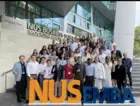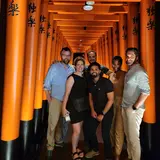
A Week of Professional and Personal Growth
MBA for Executives student Lem-Marie Chizungu ’24 reflects on how her Global Network Week experience at the National University of Singapore complemented her Yale SOM classroom learning.
I was initially motivated to pursue my MBA at Yale SOM by three goals: to enhance my sustainability expertise, to grow my professional network, and to gain global leadership development skills. I was most excited about participating in Global Network Week (GNW) in June, as this was an opportunity to grow in each of these areas. At the National University of Singapore (NUS), I enrolled in the GNW module Winning Strategies in Asia, where we explored the intersection of business opportunities, infrastructure solutions, and the cultural influences that have led to the growing markets in Asia.




My classroom was filled with powerful personalities from across 40+ industries and 20 nations, representing leading schools across the globe, including Berkeley, Oxford, and IE. I remember thinking to myself at the end of Day 1, this is the international classroom experience that truly enhances my MBA for Executives experience. We were all looking to understand operational obstacles facing multinational companies in emerging economies in Asia and to investigate proven business expansion strategies from local firms. Furthermore, we learned that after Asia, Africa was the next frontier for companies to adapt their future outlooks—as a Congolese native, hearing about business development opportunities in emerging nations was exciting and applicable to potential prospects on the continent. Professor Ishtiaq Pasha Mahmood facilitated insightful discussions on the dynamic business landscape in Asia and innovations that transformed supply chains and product delivery, highlighting cases on Tata Motor, Samsung, and 7-Eleven.



On the last day, each group proposed a business strategy for a multinational firm to succeed in Asia and leveraged the value creation and value capturing framework to highlight customer relationships across regions. A common focus area in each strategy was a call to action to embed environmentally friendly practices throughout manufacturing and product development. Presentations focused on companies across technology, oil, and consumer products, and, regardless of industry, companies and consumers are becoming more mindful of their carbon footprint and taking action to introduce climate solutions such as recycling materials, regenerative agriculture, waste reduction, and carbon removal. At the end of the course, we brought all our skill sets together to identify and remediate market challenges and tailor sustainable practices to a company’s long-term growth strategy in Asia.
At the end of each class session, my NUS classmates always shared their recommendations list for tourists in Singapore, which led the SOMers to participate in a chilli challenge at a restaurant in Little India, watch the night light show at Marina Bay Sands, taste the local Hainanese chicken rice, and on the last day enjoy a farewell celebration at an arcade (with all students toasting!).



